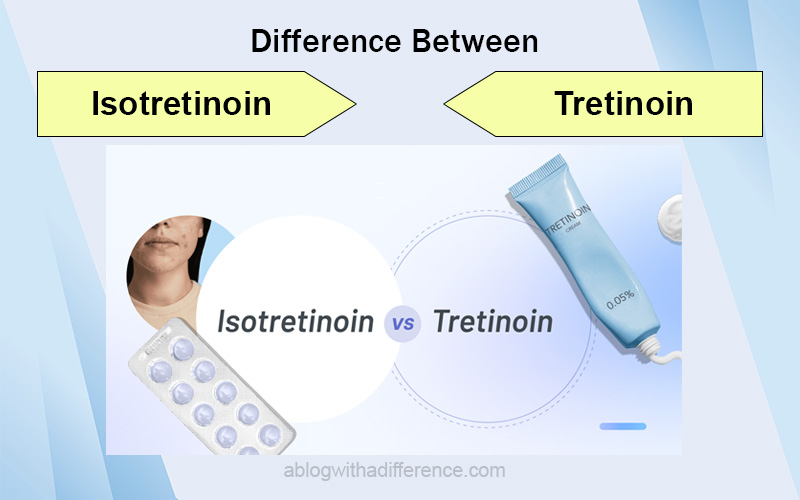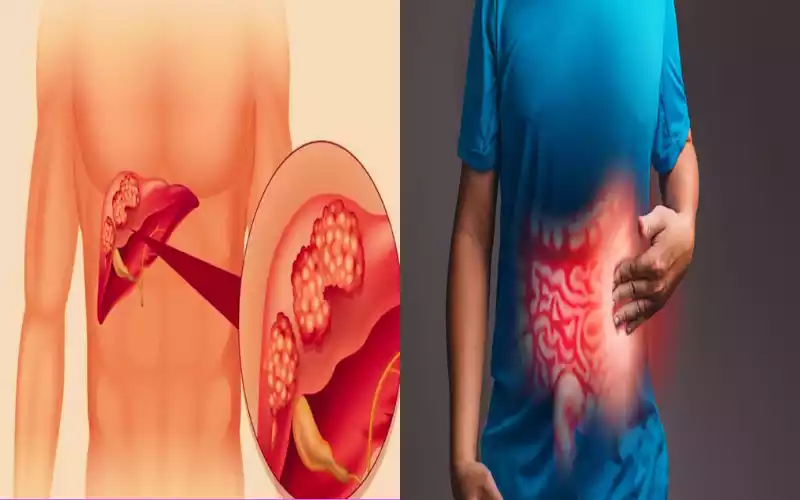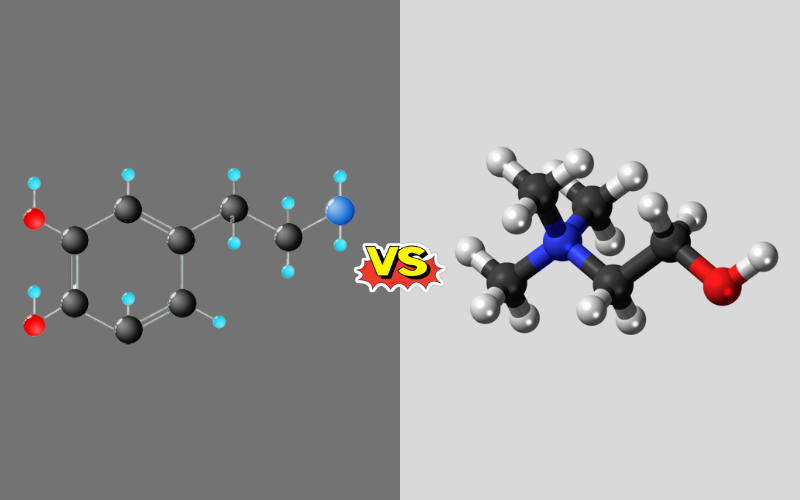Difference Between Isotretinoin and Tretinoin
Brief overview of Isotretinoin and Tretinoin
Isotretinoin and tretinoin are two medications commonly utilized by dermatologists for the treatment of various skin conditions, particularly acne. Although both medicines utilize similar mechanisms of action and formulations for acne relief, their unique therapeutic uses, side effects, safety considerations, and safety assessments make each unique.
Isotretinoin is a systemic medication, typically taken orally in the form of capsules. It belongs to a class of drugs called retinoids and is derived from vitamin A. Isotretinoin works by reducing sebum production, normalizing skin cell turnover, and reducing inflammation. It is primarily used for severe acne, cystic acne, and acne that has not responded to other treatments. Isotretinoin is also sometimes prescribed for other dermatological conditions, such as certain types of rosacea or keratosis pilaris. However, isotretinoin carries the risk of serious side effects and requires careful monitoring, particularly due to its teratogenicity (ability to cause birth defects) in pregnant women.
Tretinoin, in contrast, is an oral medication available in multiple formulations such as creams, gels and lotions. It is a type of retinoid that is also derived from vitamin A. Tretinoin works by increasing skin cell turnover, unclogging pores, and reducing inflammation. It is primarily used for the treatment of acne vulgaris, as well as for addressing signs of photoaging and other dermatological conditions. Tretinoin is often prescribed in combination with other topical or oral medications to enhance its effectiveness. Although tretinoin can sometimes lead to skin sensitivity or irritation, it should generally be safe during pregnancy and breastfeeding; although precaution should still be exercised.
In summary, isotretinoin is an oral medication used for severe forms of acne and other dermatological conditions, while tretinoin is a topical medication primarily used for acne vulgaris and photoaging. Isotretinoin carries a higher risk of side effects and requires strict monitoring, especially regarding pregnancy prevention, while tretinoin is generally considered safer. The choice between these medications depends on the specific condition being treated, its severity, and individual patient considerations.
Isotretinoin
Isotretinoin is a medication commonly prescribed for the treatment of severe acne, particularly cystic acne that has not responded to other treatments. It belongs to a class of drugs known as retinoids and is derived from vitamin A. Isotretinoin works by reducing the production of sebum (oil) in the skin, normalizing the shedding of skin cells, and decreasing inflammation.
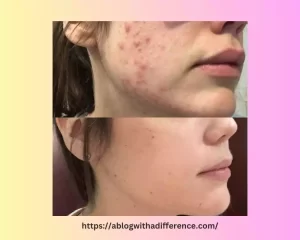
Isotretinoin is typically taken orally in the form of capsules, and the dosage is usually based on the patient’s weight. The treatment duration can vary, but it is generally taken for several months to achieve long-lasting results. Isotretinoin is highly effective in reducing acne lesions, preventing new breakouts, and improving the overall appearance of the skin.
Isotretinoin is associated with potential side effects, some of which can be serious. Common side effects may include dry skin, lips and eyes as well as increased sunlight sensitivity. Other possible side effects may include muscle or joint pain, nosebleeds, changes in mood or behavior, and elevated liver enzymes. In rare cases, more severe side effects, such as inflammatory bowel disease or psychiatric disorders, may occur. Due to the risk of birth defects, isotretinoin is strictly contraindicated during pregnancy, and effective contraception is required for sexually active women during treatment.
Because of the potential side effects and risks, isotretinoin treatment requires close monitoring by a healthcare professional. Regular blood tests and follow-up visits are often necessary to ensure the medication’s safety and effectiveness. Additionally, a comprehensive discussion about the potential benefits and risks, as well as the importance of adherence to safety precautions, is crucial before starting isotretinoin therapy.
It’s important to note that isotretinoin should only be used under the supervision of a healthcare professional and is typically reserved for severe and resistant cases of acne. It is not recommended for mild or moderate acne, and other treatment options are usually explored first.
Medical uses of Isotretinoin
Isotretinoin is primarily used for the treatment of severe acne, particularly cystic acne that has not responded to other conventional treatments. It is considered a highly effective medication for managing severe acne cases that can cause significant physical and emotional distress.
Here are the medical uses of isotretinoin:
- Severe Acne: Isotretinoin is most commonly prescribed for the treatment of severe nodular or cystic acne that is resistant to other forms of therapy. It is often recommended when acne lesions are deep, inflamed, and result in scarring or disfigurement.
- Persistent or Recurrent Acne: Isotretinoin may also be prescribed for individuals with persistent or recurrent acne despite multiple previous treatments. It is considered when other topical or oral medications have not provided satisfactory results.
- Acne with Psychological Distress: Isotretinoin may be recommended in cases where acne is causing significant psychological distress, such as low self-esteem, depression, or social withdrawal. The medication’s ability to improve severe acne lesions can help improve the patient’s overall well-being and quality of life.
- Acne Prevention: In some cases, isotretinoin may be used as a preventative measure in individuals with a high risk of severe acne development. This approach is particularly considered for individuals with a family history of severe acne or scarring.
It’s important to note that isotretinoin should only be prescribed by a qualified healthcare professional, typically a dermatologist. The decision to use isotretinoin is based on careful evaluation of the individual’s specific acne condition, its severity, and their overall health profile. Regular monitoring and follow-up visits are crucial during isotretinoin treatment to ensure safety and monitor for potential side effects.
Pharmacology of Isotretinoin
Isotretinoin belongs to the retinoid drug class, and is used mainly to treat severe acne and skin conditions.
Here’s an overview of its pharmacology:
- Regulation of sebum production: Isotretinoin decreases sebum production, an oily substance which contributes to acne development. It accomplishes this feat by decreasing both the size and activity of sebaceous glands within skin tissue.
- Anti-inflammatory effects: Isotretinoin possesses anti-inflammatory properties, which help reduce inflammation associated with acne. It inhibits the migration of certain immune cells to the skin and decreases the production of inflammatory mediators.
- Normalization of follicular keratinization: Isotretinoin promotes the normal development and shedding of skin cells within the hair follicles, preventing the formation of comedones (clogged pores) and reducing the occurrence of acne lesions.
Pharmacokinetics: Isotretinoin is primarily administered orally and is absorbed from the gastrointestinal tract. Its absorption is enhanced when taken with a high-fat meal.Once consumed orally, isotretinoin is processed through liver enzymes known as Cytochrome P450s (CYP2C8, CYP2C9 and Cytochrome 3A4) into its component parts for elimination from your system. The metabolites are further metabolized and eventually eliminated primarily through urine and feces.
Onset and Duration of Action: The onset of therapeutic response to isotretinoin can vary, but it is generally observed within the first few weeks of treatment. However, it may take several months for the full benefits to become apparent. The duration of treatment depends on the severity of the condition and individual response but typically lasts around 4 to 6 months.
Clinical Uses: Isotretinoin is primarily used for the treatment of severe nodular acne that has not responded to other treatments, including topical medications and antibiotics. It may also be used for other dermatological conditions such as certain forms of rosacea and keratosis pilaris.
Adverse Effects: Isotretinoin may cause serious side effects. Common adverse reactions include dry skin, lips and eyes as well as nosebleeds as well as muscle or joint discomfort. Other possible adverse effects include increased sensitivity to sunlight, changes in mood or behavior, elevated blood lipid levels, liver enzyme elevations, and teratogenicity (ability to cause birth defects if taken during pregnancy). Due to the teratogenic effects, women of childbearing potential must use highly effective contraception during isotretinoin treatment.
Monitoring: Patients undergoing isotretinoin therapy require regular monitoring, including blood tests to assess lipid levels, liver function, and pregnancy status (for women of childbearing potential). It is essential to closely follow the prescribing doctor’s instructions and attend all recommended follow-up appointments.
Tretinoin
Tretinoin is an over-the-counter (OTC) treatment medication commonly used to address various skin disorders, most notably acne vulgaris. It is a type of retinoid and is derived from vitamin A. Tretinoin works by promoting the turnover of skin cells, reducing the formation of acne lesions, and improving the overall texture and appearance of the skin.
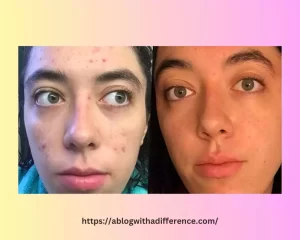
Tretinoin is available in different formulations, including creams, gels, and lotions. The choice of formulation may depend on the individual’s skin type and preferences. The medication is typically applied once daily, usually in the evening, to clean and dry skin. It is important to follow the instructions provided by the healthcare professional or indicated on the product label.
When applied topically, tretinoin can cause skin irritation, redness, dryness, and peeling, particularly during the initial weeks of treatment. These side effects are often temporary and may subside as the skin adjusts to the medication. It is recommended to start with a lower concentration of tretinoin and gradually increase as tolerated.
In addition to acne vulgaris, tretinoin may also be prescribed for other dermatological conditions, such as photoaging (skin damage caused by sun exposure), fine wrinkles, and certain types of hyperpigmentation. It is often used in combination with other topical or oral medications to enhance its efficacy.
Unlike isotretinoin, tretinoin is generally considered safe for use during pregnancy and breastfeeding. Before using tretinoin in these situations, however, it would be prudent to consult a healthcare professional first.
It is important to note that tretinoin should be used as directed and consistently for optimal results. It may take several weeks or months of regular use to see noticeable improvements in the skin. Adherence to a proper skincare routine, including gentle cleansing and moisturizing, along with sun protection, is recommended during tretinoin treatment to minimize side effects and maximize benefits.
As with any medication, it’s wise to consult a healthcare provider or dermatologist prior to beginning taking Tretinoin to ascertain whether its usage suits both your skin condition and individual circumstances. They can provide proper guidance on the appropriate formulation, concentration, and duration of treatment to achieve the best results while minimizing potential side effects.
Medical uses of Tretinoin
Tretinoin belongs to a class of medicines called retinoids and has numerous medical uses primarily related to dermatology.
Here are some common applications of Tretinoin:
- Acne: Tretinoin is often prescribed to treat acne. This treatment works by increasing skin cell turnover, reducing comedone formation (clogged pores), and relieving any associated inflammation associated with acne. Available as both topical gel or cream formulations.
- Wrinkles and Photoaging: Tretinoin is also used for the treatment of fine wrinkles, rough skin texture, and age spots caused by sun exposure. It helps to stimulate collagen production, which can improve the appearance of skin and reduce the signs of photoaging. Tretinoin is available in various strengths and is usually used topically.
- Hyperpigmentation: Tretinoin is sometimes used to treat hyperpigmentation conditions such as melasma, which causes dark patches on the skin. It can help to lighten the pigmentation and even out the skin tone when used as directed by a healthcare professional.
- Actinic Keratoses: Actinic keratoses are pre-cancerous lesions caused by long-term sun exposure. Tretinoin may be prescribed as a topical treatment to help reduce the number of these lesions or to prevent their progression into squamous cell carcinoma, a type of skin cancer.
- Other Skin Conditions: Tretinoin can be used for other dermatological conditions such as ichthyosis (a group of genetic skin disorders characterized by dry, scaly skin) and lichen planus (an inflammatory skin condition). In these cases, tretinoin is often used in combination with other treatments.
Important to remember when taking tretinoin is its potential side effects such as skin irritation, dryness and increased sun sensitivity. It should be used under the guidance of a healthcare professional, who can provide specific instructions on proper application, frequency, and potential side effects.
Difference Between Isotretinoin and Tretinoin
Isotretinoin and tretinoin are two medications with distinct uses and characteristics, making them both indispensable medications in some instances.
Here are the key differences between isotretinoin and tretinoin:
- Medical Uses:
- Isotretinoin: Isotretinoin is used primarily for treating severe acne, specifically cystic acne that has not responded well to other treatments. This drug should only be considered when acne has had an incalculable negative impact on quality of life for its patient.
- Tretinoin: Tretinoin is used for various dermatological conditions, including acne vulgaris, photoaging (skin damage caused by sun exposure), fine wrinkles, and certain types of hyperpigmentation.
- Administration:
- Isotretinoin: Isotretinoin is taken orally in the form of capsules. It is a systemic medication that is absorbed into the bloodstream and affects the entire body.
- Tretinoin: Tretinoin is a topical medication that is applied directly to the skin. It comes in various formulations such as creams, gels, and lotions.
- Mechanism of Action:
- Isotretinoin: Isotretinoin works by reducing sebum production, normalizing skin cell turnover, and decreasing inflammation. It has a systemic effect on the body, targeting multiple factors involved in acne development.
- Tretinoin: Tretinoin works by increasing skin cell turnover, unclogging pores, and reducing inflammation. It acts locally on the skin where it is applied.
- Side Effects:
- Isotretinoin: Isotretinoin may cause several unwanted side effects, some of which may be serious. Common adverse reactions include dry skin, lips and eyes as well as increased sunlight sensitivity; muscle or joint pain, nosebleeds or behavioral changes could occur as well as mood or behavior shifts requiring close monitoring by medical personnel. Isotretinoin’s impact may extend across various body systems which need close surveillance for safety purposes.
- Tretinoin: Tretinoin can cause skin irritation, redness, dryness, and peeling, particularly during the initial stages of treatment. However, the side effects are generally localized to the area of application and are less severe compared to systemic side effects of isotretinoin.
- Pregnancy Considerations:
- Isotretinoin: Isotretinoin is highly teratogenic, meaning it can cause severe birth defects if taken during pregnancy. It is strictly contraindicated for pregnant women, and effective contraception is required during treatment and for a certain period after its discontinuation.
- Tretinoin: Tretinoin is generally safe to take during pregnancy; however, healthcare providers recommend consulting first with them prior to making this decision. Tretinoin falls under Category C status; meaning animal studies have indicated possible harm for the unborn fetus but there have only been limited human studies conducted so far.
- Treatment Duration:
- Isotretinoin: Isotretinoin treatment is typically taken over a course of several months, with the duration varying based on the individual’s response and severity of acne.
- Tretinoin: Tretinoin treatment is usually long-term, and the duration can vary depending on the specific condition being treated. It may take several weeks or months to see noticeable improvements in the skin.
It’s important to note that both isotretinoin and tretinoin should be used under the supervision and guidance of a healthcare professional. The choice of medication depends on the specific condition being treated, its severity, and individual patient considerations.
Comparison chart
Here’s a comparison chart highlighting the key differences between isotretinoin and tretinoin:
| Aspect | Isotretinoin | Tretinoin |
|---|---|---|
| Medical Uses | Severe acne, cystic acne, resistant acne | Acne vulgaris, photoaging, fine wrinkles, hyperpigmentation |
| Administration | Oral capsules | Topical creams, gels, lotions |
| Mechanism of Action | Reduces sebum production, normalizes skin cell turnover, reduces inflammation | Increases skin cell turnover, unclogs pores, reduces inflammation |
| Side Effects | Dry skin, dry lips, dry eyes, muscle/joint pain, nosebleeds, mood/behavior changes, increased sensitivity to sunlight | Skin irritation, redness, dryness, peeling |
| Pregnancy Considerations | Highly teratogenic, strict contraindication during pregnancy, requires effective contraception | Generally considered safe during pregnancy (Category C), consult healthcare professional |
| Treatment Duration | Several months | Long-term |
Conclusion
Isotretinoin and Tretinoin are two medications widely prescribed to dermatology patients for various skin conditions, with Isotretinoin typically prescribed for severe acne while Tretinoin often used topically on acne vulgaris or photoaging conditions. Both can be taken orally through capsule form while Tretinoin topicals come in various formulations which affects different parts of your body differently.
Mechanisms of action also vary; isotretinoin works to limit sebum production while normalizing skin cell turnover, while tretinoin speeds this process and unclogs pores. Side effects range depending on which medication you take; isotretinoin could result in dry skin, joint pain and mood shifts while tretinoin could potentially cause skin irritation and peeling.
